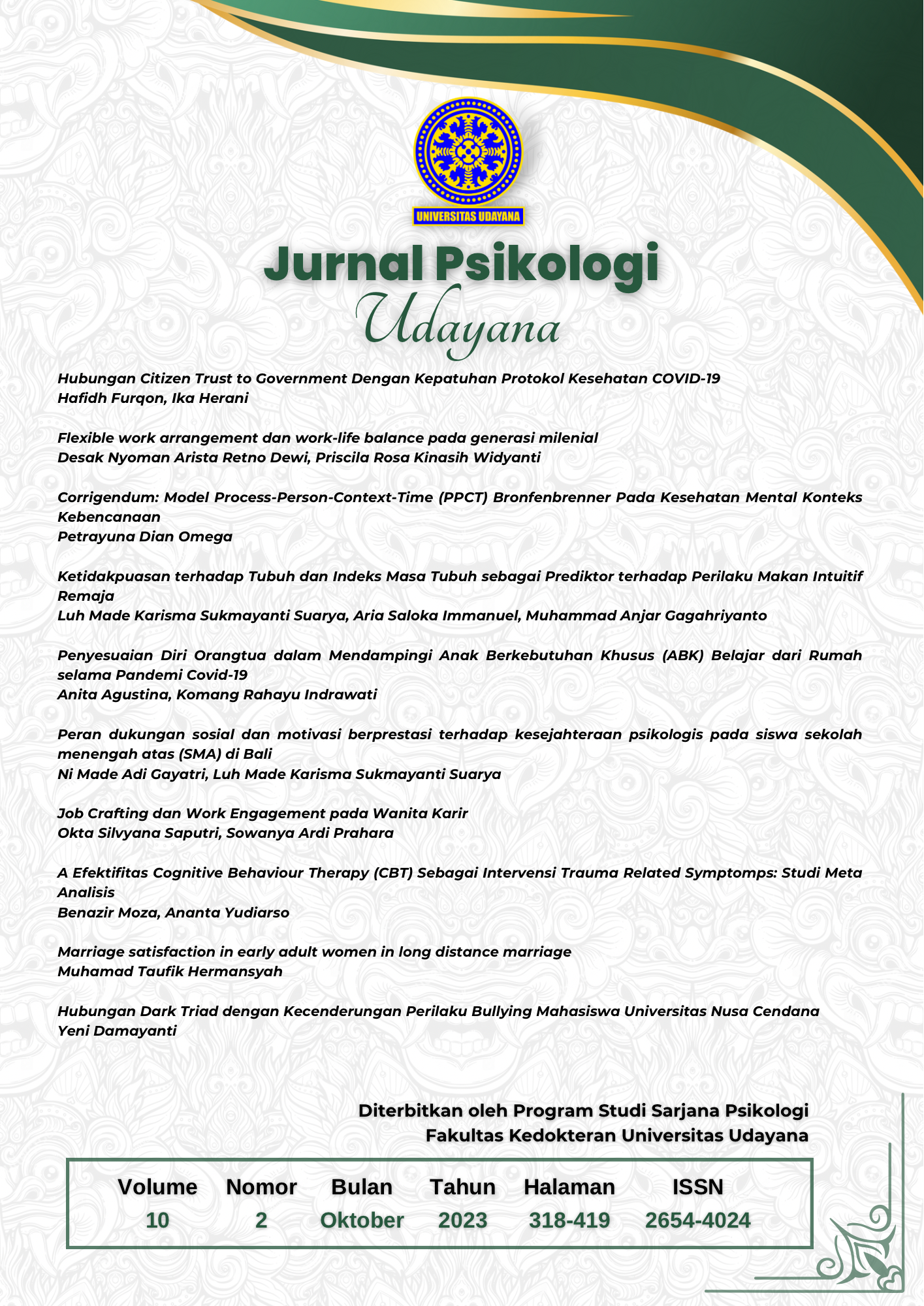Flexible work arrangement dan work-life balance pada generasi milenial
Abstract
Currently, millennial generation employees are the working group that dominates employment in Indonesia. Millennial generation employees are characterized by their awareness of getting work-life balance. This is in line with the survey results which show that the majority of millennial employees want a balance between their personal and work lives. The opportunity to apply flexible work arrangements is believed to have an effect on employees' work-life balance conditions. In the COVID-19 pandemic situation, the application of working from home makes implementing flexible work arrangements a challenge to be able to get a work-life balance. This is because the actual working hours exceed the supposed working hours. The purpose of this study is to analyze the effect of implementing flexible work arrangements on work-life balance conditions for millennial employees. This research is a quantitative research with work-life balance as dependent variable and flexible work arrangement as independent variable. The data collection method used a Likert scale with five alternative answer choices. The research subjects are millennial generation employees who work with a hybrid system or a combination of work from home and work from office. Data analysis used non-parametric Kendall's tau-b correlation test because one of the assumption tests was not met. The results showed a significance value of 0.332 > 0.05, which means that there is no influence between flexible work arrangements and work-life balance. There are other factors that are more personal in nature that can support the achievement of work-life balance for millennial generation employees.
Downloads
References
Bagaskara, A. I., Kamal, I., & Hilmiana. (2021). Influence Of Flexible Work Arrangement And Work Environment On Emloyee Performance Through Work-Life Balance. AFEBI MANAGEMENT & BUSINESS REVIEW (AMBR). Vol 6, No 1, 73-85.
Bendisch, F. A. (2020). Millenials want a healthy work-life balance, here’s what bosses can do. Forbes.
BPS. (2020). Keadaan Angkatan Kerja di Indonesia Februari 2020.
Bratton, J., & Gold, J. (2017). Human Resource Management: Theory and Practice (5th editio). Palgrave Macmillan.
Breaugh, J. A., & Farabee, A. M. (2012). Telecommuting and Flexible Work Hours: Alternative Work Arrangements that Can Improve the Quality of Work Life. In Work and Quality of Life (pp. 251–274). Springer Netherlands. https://doi.org/10.1007/978-94-007-4059-4_14
Bresman, H. (2015). What millenials want from work, charted across the world. Harvard Business Review 2, March 2015.
Buchanan, D., & Huczynski, A. (2017). Organizational Behavior (Ninth edit). Pearson Education.
Erden Bayazit, Z., & Bayazit, M. (2019). How do flexible work arrangements alleviate work-family-conflict? The roles of flexibility i-deals and family-supportive cultures. The International Journal of Human Resource Management, 30(3), 405–435. https://doi.org/10.1080/09585192.2017.1278615
Fadhila, A. A., & Wicaksana, L. (2020). Sistematik Review: Flexible Working Arrangement (FWA) Sebagai Paradigma Baru ASN di Tengah Pandemi Covid-19. Spirit Publik: Jurnal Administrasi Publik, 15(2), 111–130.
Fauzia, M. (2020). LinkedIn: Work Life Balance Kunci Kepuasan Bekerja. Kompas.
Faisal, M. (2017). Generasi phi: memahami milenial pengubah Indonesia. Republika.
Felstead, A., & Henseke, G. (2017). Assessing the growth of remote working and its consequences for effort, well-being and work-life balance. New Technology, Work and Employment, 32(3), 195–212. https://doi.org/10.1111/ntwe.12097
Fisher, G. G., Bulger, C. A., & Smith, C. S. (2009). Beyond work and family: A measure of work/nonwork interference and enhancement. Journal of Occupational Health Psychology, 14(4), 441–456. https://doi.org/10.1037/a0016737
Giannikis, S. K., & Mihail, D. M. (2011). Flexible work arrangements in Greece: a study of employee perceptions. The International Journal of Human Resource Management, 22(2), 417–432. https://doi.org/10.1080/09585192.2011.540163
Hayman, J. R. (2009). Flexible work arrangements: exploring the linkages between perceived usability of flexible work schedules and work/life balance. Community, Work & Family, 12(3), 327–338. https://doi.org/10.1080/13668800902966331
Herachwati, N. (2019). Work life balance pada generasi Y di Indonesia. Universitas Airlangga.
Hill, E. J., Hawkins, A. J., Ferris, M., & Weitzman, M. (2001). Finding an Extra Day a Week: The Positive Influence of Perceived Job Flexibility on Work and Family Life Balance*. Family Relations, 50(1), 49–58. https://doi.org/10.1111/j.1741-3729.2001.00049.x
Irawanto, D., Novianti, K., & Roz, K. (2021). Work from Home: Measuring Satisfaction between Work–Life Balance and Work Stress during the COVID-19 Pandemic in Indonesia. Economies, 9(3), 96. https://doi.org/10.3390/economies9030096
Mungkasa, O. (2020). Bekerja dari Rumah (Working From Home/WFH): Menuju Tatanan Baru Era Pandemi COVID 19. Jurnal Perencanaan Pembangunan: The Indonesian Journal of Development Planning, 4(2), 126–150. https://doi.org/10.36574/jpp.v4i2.119
Ng, E. S. W., Schweitzer, L., & Lyons, S. T. (2010). New Generation , Great Expectations : A Field Study of the Millennial Generation. 281–292. https://doi.org/10.1007/s10869-010-9159-4
PwC. (2011). Millennials at work Reshaping the workplace.
Rau, B. L., & Hyland, M. A. M. (2002). Role Conflict and Flexible Work Arrangements: The Effects on Applicant Attraction. Personnel Psychology, 55(1), 111–136. https://doi.org/10.1111/j.1744-6570.2002.tb00105.x
Schabracq, M. J., Winnubst, J. A. M., & Cooper, C. L. (Eds.). (2002). The Handbook of Work and Health Psychology. John Wiley & Sons, Ltd. https://doi.org/10.1002/0470013400
Smith, K. T. (2010). Work-Life Balance Perspectives of Marketing Professionals in Generation Y. Services Marketing Quarterly, 31(4), 434–447. https://doi.org/10.1080/15332969.2010.510724

This work is licensed under a Creative Commons Attribution-ShareAlike 4.0 International License.
Authors who publish with this journal agree to the following terms:
- Authors retain copyright and grant the journal right of first publication with the work simultaneously licensed under a Creative Commons Attribution-ShareAlike 4.0 International License that allows others to share the work with an acknowledgement of the works authorship and initial publication in this journal.
- Authors are able to enter into separate, additional contractual arrangements for the non-exclusive distribution of the journals published version of the work (e.g., post it to an institutional repository or publish it in a book), with an acknowledgement of its initial publication in this journal.
- Authors are permitted and encouraged to post their work online (e.g., in institutional repositories or on their website) prior to and during the submission process, as it can lead to productive exchanges, as well as earlier and greater citation of published work (See The Effect of Open Access).













